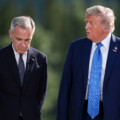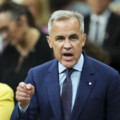Earlier this month Campbell Clark of The Globe and Mail remarked that “there are some people who say that Conservative politicians are liars who will say anything to get elected, govern unethically, or flirt with racial discrimination to win votes. But those are just the people running for the leadership of the Conservative Party.”
In two sentences Clark precisely described the current temperature of the Conservative Party of Canada leadership race. Such a scathing take should be cause for concern—we are witnessing colleagues of the same political stripe denouncing each other after all. While such friendly fire is unsavoury, it also allows for a much deeper reflection which these leadership candidates and the party as a whole ought to be having.
Attacks like those recently launched by Pierre Poilievre and Patrick Brown—”you’re a liar,” “no, you’re a liar” and “you will do and say anything to win”—include an implicit value judgement that it is desirable for a political leader to be truthful, consistent, and to operate with integrity. These attacks would be meaningless if such character traits were not valued in political life. But are they valued by the accusers themselves?
At the heart of these critiques is the judgement that a leader must not only be principled but consistently so. If candidates are willing to lob these attacks at one another in public, it would be wise for them to contemplate what it means and what it takes to be consistently principled.
On this topic, much wisdom and practical guidance can be gleaned from the Conservative’s recent approach to the passage of Bill C-4, by which conversion therapy (and arguably far more than what is intuitively meant by this term) was officially banned in Canada.
In the Fall of 2021, the Liberals introduced for the third time a bill to ban conversion therapy.
While Bill C-4—the most recent iteration of the bill—mirrored previously introduced legislation (Bill C-8, in the 43rd Parliament, 1st Session and Bill C-6 in the 43rd Parliament, 2nd Session), it did contain substantive alterations and continued to deeply concern some Conservative MPs. It should be noted that those concerned MPs had been clear from the beginning that they thoroughly opposed conversion therapy properly defined.“The definition does not just apply to efforts to change a person’s sexual orientation – it could also ban many different kinds of advice and counsel from parents, teachers, and guidance counselors encouraging children to reduce their sexual behaviour. (E.g., A counselor encourages a young person to reduce his or her number of sexual partners).” https://www.garnettgenuismp.ca/fix_the_definition
Despite thorough opposition from the Conservatives when similar legislation was previously introduced, on December 1st Conservative MP Rob Moore rose in the House to seek unanimous consent to pass Bill C-4 at all stages—essentially fast-tracking the legislation. Without any dissenting voice to be heard, the bill was passed to what seemed like resounding acclamation.
Bill C-4’s passage at the initiative of the Conservatives was heralded by some, but quietly it grated on the consciences and morale of interested observers. It did so because it violated a host of key principles in the name of political expediency.
First, by using a unanimous consent (UC) motion to pass the bill at all stages and readings the Conservatives showed a lack of respect for the democratic process and parliamentary tradition. This is not to say that UC motions are inherently undemocratic or offensive to Parliament. No, UC motions are a viable tool and can aid parliamentary processes in the right contexts. The offense in this situation, however, was that Bill C-4 was passed only after the first reading. The bill, which has now amended our Criminal Code, received no parliamentary scrutiny at all. Parliamentarians, in consenting to the UC motion on a substantive bill failed to do their jobs, they abrogated their most basic duty to country and constituent: to ensure thoughtful laws are passed.
Second, ensuring passage of C-4 through a UC motion was a blatant policy flip-flop displaying a total disregard for policy integrity. The policy was clear as the electoral platform of the Conservative Party of Canada clearly stated that “Using the Justice Department’s explanatory language about the intention of the ban, we will clarify that the ban does not criminalize non-coercive conversations, giving comfort to parents and others who fear that legitimate conversations might be criminalized.” C-4 contained no clarity on this and by passing the bill via unanimous consent, Conservatives forfeited any opportunity to seek such clarity through committee study or amendment at further readings. Like other policy flip-flops, it left the party even more unsure of itself ideologically and compromised the integrity of the party.
Third, the Conservatives as the Official Opposition failed in this role—they failed to oppose. Simply put, it is rare for an opposition party to vote in favour of any government bill. It is exceedingly rare for an opposition party to initiate a UC motion to pass a government bill. In fact, this may be one of the only times in Canadian parliamentary history that such an instance has occurred. While this critique is more partisan in nature, it references the basic duty that an official opposition party has—to oppose. Ideally, to oppose thoughtfully in the interest of all Canadians.
Fourth, the handling of C-4 was an affront to caucus solidarity and collegiality. Initiating a UC motion on a bill known to be contentious was deeply offensive to those who maintained serious concerns with the framing of the bill (62 Conservative MPs voted nay and 51 voted yea on Bill C-6 the previous June). It was offensive because it did not allow MPs to vote their consciences in the same way that a regular vote in the House does. Under the parameters of a UC motion, any nay vote breaks the consensus and the motion therefore fails. The stakes are significantly higher, especially when you are a member of the caucus who put forward the UC motion. It would have been political suicide for a Conservative MP to break the consensus. Positioning MPs to choose between career and conscience is highly disturbing because it is bereft of professionalism, collegiality, and lacks basic human respect.
In violating these principles in the handling of C-4, what was meant to be an elegant tactical move, produced a chasm of frustration within the Conservative caucus about much more than conversion therapy itself. It did so because it so blatantly lacked principle, displaying instead political opportunism.
Why then was this strategy pursued? One answer is that it was believed that Liberal wedge politics could be thwarted by taking control of the situation. That immediately passing the legislation would instantly blunt the Liberal wedge. Strategically this was keen as the Liberals were poised to once again wedge the Conservatives with exceptional precision and effectiveness.
How? C-4 not only included an expanded and more ideologically charged definition of what constitutes conversion therapy, but it also extended the ban to all persons. Whereas previous iterations of the legislation banned conversion therapy for minors and forced conversion therapy for adults, C-4 provides an outright ban irrespective of age or consent. In pushing the scope of the ban further the Liberals sharpened their wedge, knowing full well that it would aggravate their opponents and that certain Conservative MPs wouldn’t be able to stay quiet. This degree of wedge politics is cynical, egregiously partisan, and tokenizes a particular group and serious issue of human dignity towards political ends. It should shock our collective conscience.
While several commentaries have critiqued C-4 and its numerous problems, one notable element of the bill has seemingly been overlooked. Our Criminal Code now includes a state-sanctioned bias toward one type of gender ideology and treatment (transitioning and the embrace of non-heteronormative sexual lifestyles) while criminalizing other forms of gender ideology and treatment (cisgender affirming therapy or counselling for same-sex attraction). This dynamic is found within the definition of conversion therapy in the bill.“320.101 In sections 320.102 to 320.104, conversion therapy means a practice, treatment or service designed to (a) change a person’s sexual orientation to heterosexual; (b) change a person’s gender identity to cisgender; (c) change a person’s gender expression so that it conforms to the sex assigned to the person at birth; (d) repress or reduce non-heterosexual attraction or sexual behaviour; (e) repress a person’s non-cisgender gender identity; or (f) repress or reduce a person’s gender expression that does not conform to the sex assigned to the person at birth.” https://www.parl.ca/DocumentViewer/en/44-1/bill/C-4/first-reading Among other things, it is now criminal to attempt to change or repress a person’s sexual orientation to heterosexual or gender identity to cisgender. But treatments or services that relate to a person’s gender transition are exempted and therefore legal.“For greater certainty, this definition does not include a practice, treatment or service that relates to the exploration or development of an integrated personal identity — such as a practice, treatment or service that relates to a person’s gender transition — and that is not based on an assumption that a particular sexual orientation, gender identity or gender expression is to be preferred over another.” https://www.parl.ca/DocumentViewer/en/44-1/bill/C-4/first-reading
That the government has now enshrined in the Criminal Code its own ideological bias on matters of sexual identity and orientation while also establishing criminal sanctions against those who contravene their bias is a form of illiberalism and state intrusion into our personal lives that is unparalleled in Canada. It is profoundly disturbing, incredibly dangerous, rather autocratic, and something, frankly, that you would expect from a theocratic state.
But what is the cause of greater scandal, that the Trudeau Liberals drafted this egregious legislation or that Erin O’Toole’s Conservatives spearheaded its passing without scrutiny? Put another way, is it more scandalous to push one’s position to an extreme or to abandon one’s position entirely? The answer, I believe, is found in the fate that befell O’Toole.
In this small case study of sorts, it can be appreciated how a political leader can be tempted to forsake key principles for political expediency, but in doing so compromises their integrity and debases the leadership qualities which are so desired—integrity, honestly, collegiality and consistency.
To accuse your opponent of dishonesty is to say you value honesty. Likewise, to accuse your opponent of inconsistency is to say you value consistency. Political life, especially at the helm of a federal party, requires steadfast principles. But would any of the current candidates for leadership have approached C-4 differently? Some were even complicit in it after all.
As one watches the various accusations of dishonesty and inconsistency fly we should also ask ourselves if the accusers are any better, if they’ve learned from those who have gone before them. True leadership takes character, courage, and magnanimity, all of which emanate from chosen principles. When such principles were sacrificed in the handling of C-4 did any of the current leadership candidates notice? They’d be wise to spend some time reflecting on the connection between C-4 and Erin O’Toole’s downfall.
Recommended for You

The state of Canada’s economy halfway through 2025

Peter Menzies: It’s no wonder Canadians are tuning out the legacy media

The Notebook by Theo Argitis: Trump halts trade talks, Carney’s trade-offs and John McCallum’s legacy

Lydia Perovic: The future of history looks bleak, if Toronto’s museums are any indication



